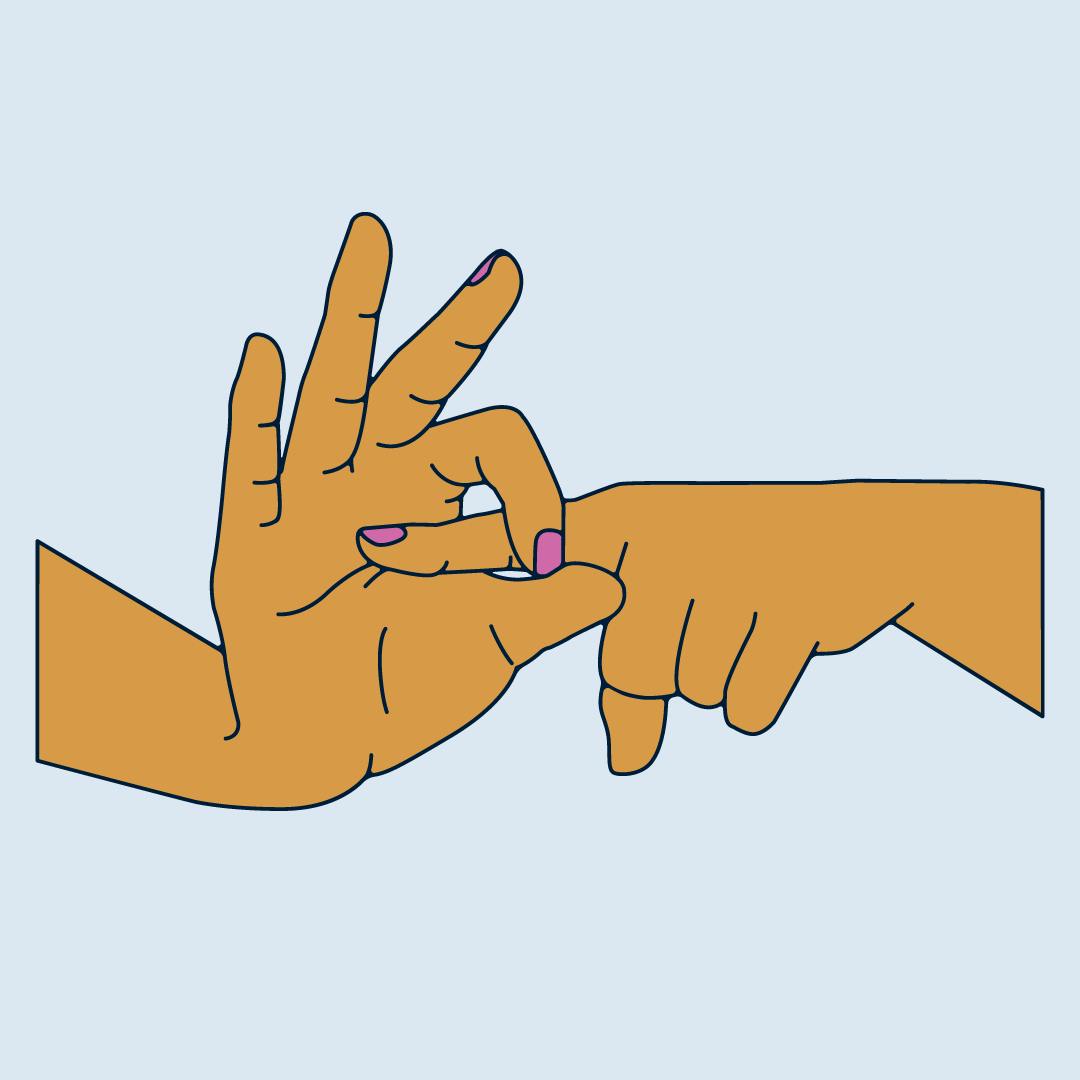Table of contents
1. What happens to the body when you have endometriosis?
2. How can endometriosis impact your sex life?
3. Are there any medical coping strategies for when endometriosis impacts your sex life?
4. Are there any natural coping strategies for when endometriosis impacts your sex life?
Illustrated by Ralitza Nikolova
Poppy is 28; and she was diagnosed with endometriosis over 10 years ago. “When I started having sex, it was very painful,” she tells me. “I found this embarrassing and although I had been with my boyfriend for a year, we were both young and it was hard for me to discuss how I was feeling with him: that I was struggling to have sex which is something that is enjoyed by the rest of the world. It was extremely alienating.”
Sadly, Poppy’s experience is far from rare. Endometriosis impacts around 1 in 10 women and AFAB individuals; and painful sex is one of the major symptoms. It’s a cruel (or, rather, even crueller) symptom, too. Excruciating pain can be bad enough; but, as Poppy described, pain during sex (also known as dyspareunia) can impact your mental wellbeing as well. It can be isolating, embarrassing and traumatic in equal measure; and, as a consequence, endometriosis can leave both your physical and mental health in tatters.
But all doesn’t have to be lost. Here at Daye, we’ve partnered with Emjoy to explore how to navigate a healthy, satisfying sex life if you suffer from endometriosis; but first things first…
What happens to the body when you have endometriosis?
More and more people are gaining an understanding of this common and debilitating illness; but it’s still frequently misunderstood, and so it’s always worth getting a refresher.
“[Endometriosis is a] chronic inflammatory condition in which endometrial tissue (tissue that forms the lining of the uterus) is present outside of the uterus (most commonly in the pelvis, including the ovaries and the lining of the abdominal cavity),” says Dr. Natalia C. Llarena, MD, FACOG, Board Certified Reproductive Endocrinologist at HRC Fertility.
Millennial doctor Dr. Tanaya Cuterus expands further. “When you get your periods, all of this tissue that is not inside your uterus also bleeds, and because this blood cannot leave the body any more, people face severe pain and other related issues,” she says. Dr. Tanaya describes these issues – or symptoms – as including:
- “Pain while defecating”;
- “Pain during penetration”;
- “Pain during sex”.
Dr. Llarena adds that other endometriosis symptoms include “chronic pelvic pain and infertility”.

How can endometriosis impact your sex life?
Kristina S. Brown, Ph.D., LMFT, is a Professor and Chair of the Couple and Family Therapy Department at Adler University. “We know that infertility and pain impact our mental, emotional, and physical experiences of intimacy and sex,” she explains. “Infertility causes complications, shifting the meaning of intercourse to pressured procreation, and pain (or stomach issues) can shut us down from wanting to or being able to be intimate. These can both impact a person’s sex life.
“Pain with intercourse specifically impacts the experience of sex and intimacy,” Dr. Brown continues. “The most common is pain with penetrative intercourse, including pain from friction as well as ‘poking’ tender spots that cause pain.”
This excruciating pain – and subsequent loss of intimacy – can impact relationships, too; which, in turn, can further impact a person’s sex life (otherwise known as a vicious cycle). “When people suffering from endometriosis do have sex, the pain from penetration is so severe that people might want to just stop having sex altogether,” says Dr. Tanaya. “The avoidance of sex due to the severe pain might lead to relationship problems, [as well as] lots of issues with [your] sex life like feelings of frustration [and] doubting one’s self worth.”
Dr. Brown agrees. “A single painful [sexual] interaction can cause anxiety,” she says. “As a result, this anxiety can cause higher experiences of pain or an avoidance of pain. [Therefore,] pain in sex can pull partners apart as they begin to avoid sex and intimacy for fear that it may lead to sex and the resulting pain due to endo[metriosis].
“This is also true for the partner without endo,” Dr. Brown continues: “Their fear or anxiety can come from the guilt of causing pain to their partner. As a result, they may avoid sex or intimacy so they do not perpetrate pain. I call this the anticipatory fear cycle, and many relationships can get stuck here.”
“
Debilitating pelvic pain and pain during intercourse are not normal and can be treated.
Are there any medical coping strategies for when endometriosis impacts your sex life?
Well, let’s start with treatment for endometriosis itself; which usually begins with understanding your own specific condition. “Endometriosis can affect people very differently depending upon where the tissue is growing, what is the size of the tissue, etc.,” says Dr. Tanaya. “Having a long consultation with your doctor is the best idea.”
“I recommend getting evaluated and treated at a centre with extensive experience with endometriosis,” Dr. Llarena agrees. “Minimally invasive gynecologic surgery specialists often specialise in the treatment of endometriosis, and some reproductive endocrinologists have this surgical expertise as well.” Once you have a better understanding of what’s going on in your body – and how you may be able to treat the pain – you’ll be able to assess how you may be able to treat the specific pain you’re experiencing during sex.
“Typically, hormonal medications such as birth control pills are the first-line treatment for pain associated with endometriosis,” Dr. Llarena continues. “For women who do not have improvement with medication, endometriosis can be treated surgically, which can help improve pain with intercourse.”
And if you feel as though your pain is being dismissed: it’s vital to keep going. “On an average, it takes seven [and a half] years to get diagnosed with endometriosis so people are given options that don’t really work for them for a very long time until they are correctly diagnosed [with] endometriosis,” Dr. Tanaya explains.
This was Poppy’s experience. “I went to the doctor because [the painful sex] was so bad, who told me that I should try drinking alcohol before having sex to relax a little!,” she says. “This comment has always stayed with me. Eventually I changed doctors, and this was how my endometriosis was finally diagnosed.”
“The most important thing is to begin with a biological understanding of what is going on and pursue medical intervention,” says Dr. Brown. “[Endo sufferers] are often told the pain is due to trauma or that it is ‘all in their head’, or they are overreacting” – a response otherwise known as the gender pain gap, which sees women’s pain being frequently dismissed or brushed off. “It is important to advocate for your care within the healthcare system, including the pursuit of additional opinions should your health needs not be met.”
This advice applies to painful sex as much as any other pain-related symptom. As Dr. Llarena says: “Debilitating pelvic pain and pain during intercourse are not normal and can be treated.” It’s vital to push for answers – and, correspondingly, treatment – if you feel that your concerns around painful sex aren’t being taken seriously.
Are there any natural coping strategies for when endometriosis impacts your sex life?
In short: yes. Looking to the pelvic floor first: “Many women with endometriosis also develop pelvic floor dysfunction as a result of chronic pelvic pain, and this can be managed with pelvic floor physical therapy,” says Dr. Llarena.
This is an approach that Poppy found helpful. “Recently, I have started pelvic physio and attended a pain management course through the NHS which has massively helped,” she says. “However, it is a shame that it has taken over 10 years for these solutions to be offered to me.”
When it comes to sex specifically, the Emjoy audio app is an ideal place to start: it has hundreds of audio sessions centred on female pleasure, including an entire collection dedicated to endometriosis. The collection offers guided meditations and affirmations to help people suffering from endometriosis, as well as tips for exploring sex when you have the condition and how to talk about it with a partner. You may find that your journey to a satisfying sex life becomes smoother (and less rife with endometriosis-related potholes) than you ever thought possible.
And in general, communication is key to overcoming difficulties in the bedroom and finding less (or non-) painful ways to enjoy sex that aren’t purely penetration-related. Discussing your sexual needs and preferences with your partner can be a very difficult thing to do – it makes us feel vulnerable and naked in more ways than one – but it could just result in a much happier sex life, if you suffer from endometriosis. “The most important [thing] is to communicate and be creative,” says Dr. Brown. “Encourage partners to expand their sexual intimacy beyond penetrative acts as well as communicate about their likes and dislikes, working together to expand their sexual intimacy.”

When it comes to endometriosis in general, communication in all forms is crucial in order to continue raising awareness of the condition in general, as well as its propensity to cause pain during sex. “I have continued to struggle with painful sex throughout my life and it can be really challenging,” says Poppy. “Endometriosis is such a complicated illness and much more understanding and support is needed for those who are suffering.”






